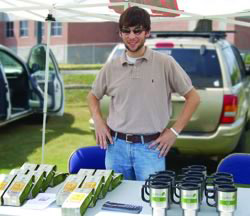Fair Trade Coffee Benefiting World Hunger Campaign

David Buys
Could drinking your coffee each day benefit the world? It can if you drink a special blend being sold through the Auburn University Committee of 19.
The Committee of 19, a student-led group created at Auburn in 2004 to help raise awareness of international hunger issues, is selling a specially formulated Fair Trade coffee blend to help raise money for the War on Hunger, and the idea is working well.
David Buys, a member of the Committee of 19 and a graduate student in the College of Human Sciences (CHS), initiated the project this spring with an Alabama-based Fair Trade coffee company, Higher Ground Roasters in Leeds.
The idea sprang from Buys' deep conviction that solutions to hunger must be long-term and sustainable. “If we are going to talk about long-term solutions, we must incorporate those values in our fund-raising,” says Buys. “The good news is that, with this project, we are able to combine both long-term solutions through the Fair Trade aspect and short-term needs by giving money back.”
Fair Trade certification means that the farmers who grew the coffee were paid a wage that is fair for the work required to produce their product. Fair Trade cooperatives usually consist of small family farms that, outside of the cooperatives, would be exploited and, in some cases, literally unable to feed their families.
The Committee of 19's special coffee is a blend of Ethiopian and Bolivian Fair Trade coffee beans, specially chosen for the War on Hunger because of their exceptional flavors and because both Ethiopia and Bolivia are beneficiaries of the United Nations World Food Programme (WFP), which initiated the AU/WFP partnership.
The coffee is shade-grown to ensure high quality coffee and also to provide a natural habitat for birds and wildlife in their native environment. It also is certified as USDA Organic, which means no harmful chemicals were used in the growing process. And it is roasted right here in Alabama by Higher Ground Roasters (www.highergroundroasters.com).
The War on Hunger project began on the AU campus in 2004 when WFP administrators asked College of Human Sciences Dean June Henton to establish a pilot campus-based program that could develop and promote sustainable solutions to hunger problems.
Henton and Harriet Giles, CHS's director of external relations, with input from across the AU campus, created the Committee of 19. The committee's name symbolizes the 19 cents per day it takes WFP to feed a school child in the developing world. Student representatives from each school and college at Auburn as well as other program areas on campus serve on the committee and the group works to educate people about hunger issues across the world and here at home.
The War on Hunger Fair Trade coffee blend, which is available in the Auburn area at the weekly Thursday afternoon Auburn University farmers' market (The Market at Ag Heritage Park), can also be purchased on campus in the Lowder Business Building (Room 028), Spidle Hall (Room 210) or in the CoAg Dean's office in Comer Hall. The coffee is also available through the Alabama Rural Heritage Foundation gift shop in west Alabama, which can be contacted at 334-627-3388 and is located in Thomaston. Orders may also be placed by contacting Buys at buysdav@auburn.edu. Cost is $10 a bag (ground or whole bean), of which approximately $2 goes directly to the WFP for the Global School Feeding Initiatives.
